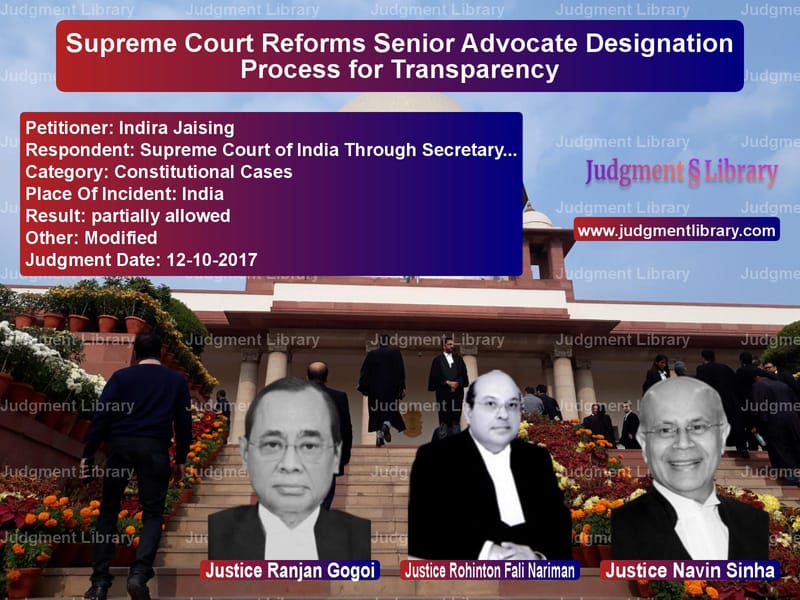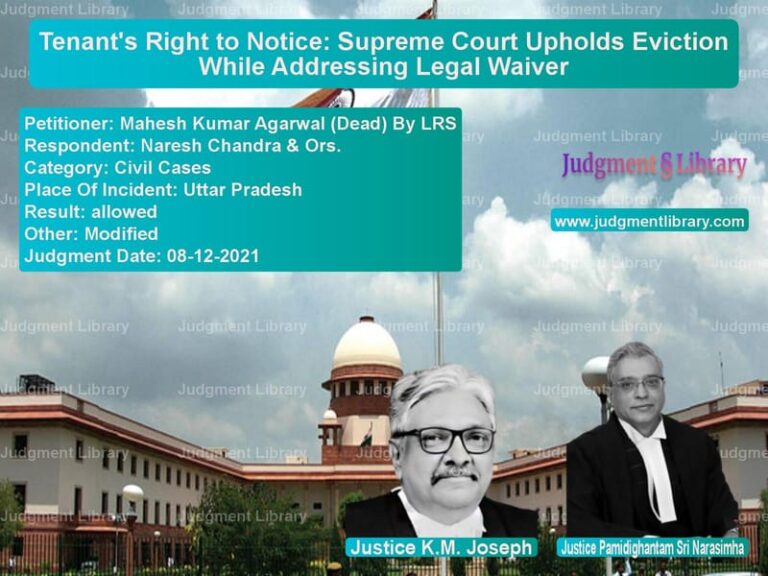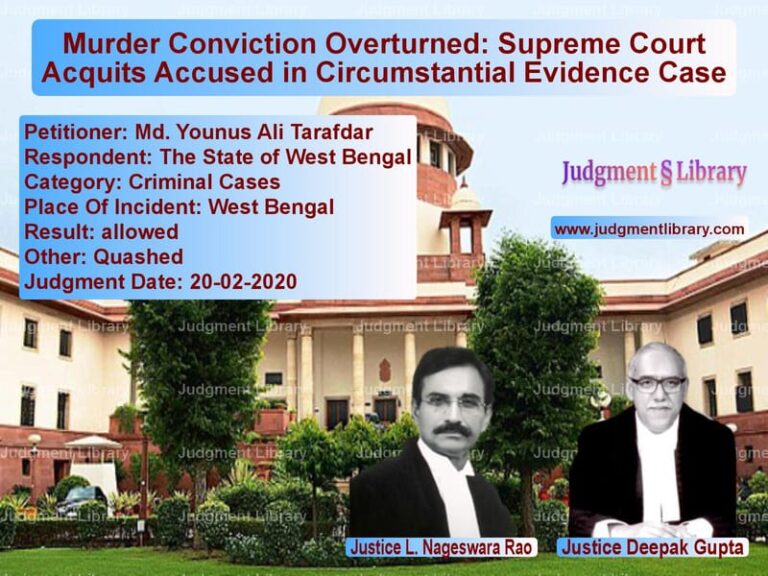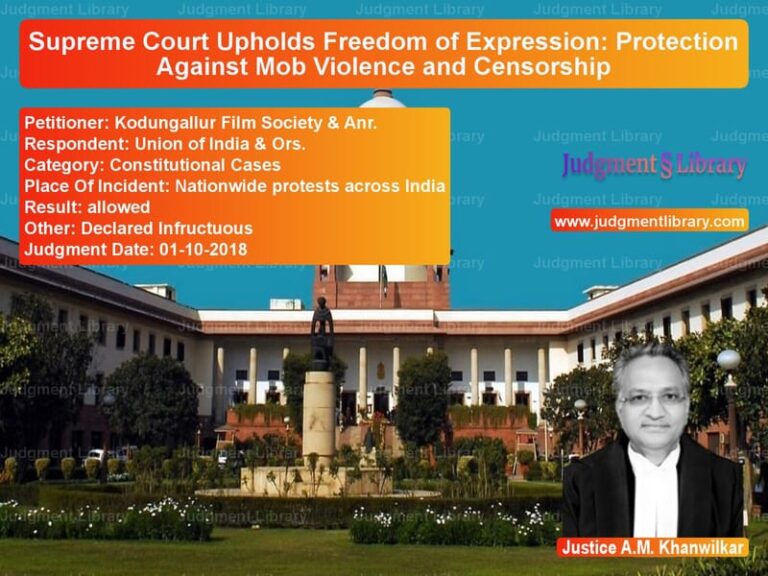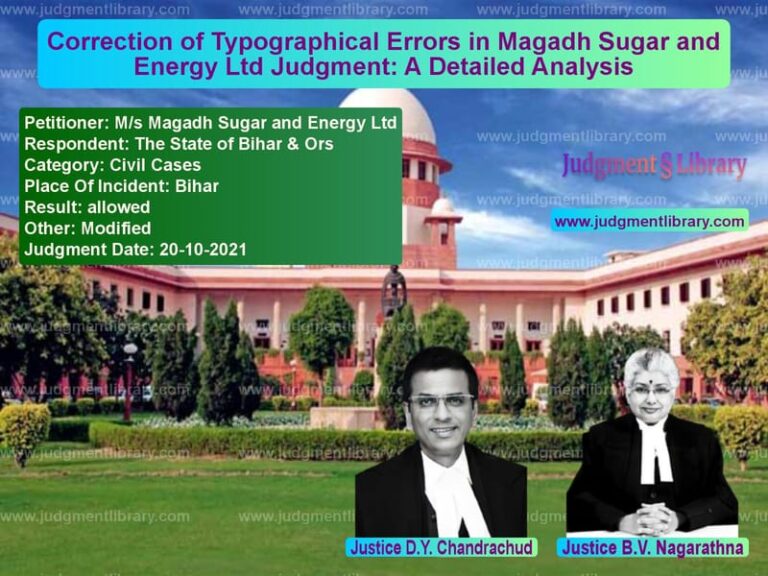Supreme Court Reforms Senior Advocate Designation Process for Transparency
The Supreme Court of India has delivered a landmark judgment in the case of Indira Jaising vs. Supreme Court of India, fundamentally reforming the process for designating Senior Advocates. This ruling ensures greater transparency, fairness, and objectivity in selecting Senior Advocates under the Advocates Act, 1961.
Ms. Indira Jaising, a Senior Advocate herself, filed a petition challenging the existing system, which she contended was opaque, arbitrary, and lacked clear selection criteria. The Supreme Court, acknowledging the issues, has now introduced a structured mechanism for the designation process.
Background of the Case
The designation of Senior Advocates is a matter of privilege granted by the courts under Section 16 of the Advocates Act, 1961. Senior Advocates are distinguished members of the legal profession recognized for their expertise, contribution to law, and experience. Their designation, however, was based on the subjective discretion of judges without a standardized selection process.
Ms. Indira Jaising contended that:
- The process of designating Senior Advocates lacked transparency.
- The selection criteria were vague, leading to favoritism.
- The absence of structured guidelines made it difficult for competent advocates, especially from marginalized backgrounds, to be recognized.
- A more objective system based on merit, publications, court performance, and legal acumen was necessary.
The petition sought:
- Establishment of a Permanent Committee to oversee designations.
- Introduction of a point-based evaluation system.
- Inclusion of legal scholars and bar members in the decision-making process.
Arguments of the Petitioner
Ms. Jaising argued:
“The process of designating Senior Advocates must be free from subjectivity and favoritism. The legal profession should have clear, merit-based selection criteria.”
She contended that the existing system failed to provide opportunities to deserving candidates, especially those without strong personal networks. She emphasized the need for a structured system where applicants could demonstrate their contributions to law.
Arguments of the Respondents
The Supreme Court, represented by the Secretary General, countered:
- The existing system had worked well for decades and was based on the discretion of judges.
- Judges, having observed lawyers in court, were best suited to assess their legal abilities.
- Adding external members to the selection process might dilute the judiciary’s authority.
Supreme Court’s Key Observations
The Court acknowledged the need for reform and emphasized:
“The process must be transparent and objective while retaining judicial discretion in recognizing excellence in the profession.”
It introduced several key changes:
- Formation of a Permanent Selection Committee for designating Senior Advocates.
- The committee would include the Chief Justice of India, the two senior-most judges, the Attorney General, and a distinguished jurist.
- A point-based system was introduced, where candidates would be evaluated on:
- Years of practice (up to 25 points).
- Judgments where the advocate played a crucial role (up to 40 points).
- Published legal research and academic contributions (up to 15 points).
- Pro bono work and contributions to social justice (up to 20 points).
- Public disclosure of shortlisted candidates and inviting public objections.
- Provision for revoking Senior Advocate status in cases of misconduct.
Final Judgment
The Supreme Court ruled:
- The new framework would be applied immediately.
- All pending applications for Senior Advocate designation would be processed under the new system.
- Existing Senior Advocates would not be affected, but future revocations could be considered based on the new guidelines.
Impact of the Judgment
This ruling has far-reaching consequences for the legal profession:
- Transparency and Fairness: The new selection process eliminates bias and favoritism.
- Encouraging Young Talent: Advocates from diverse backgrounds have a clearer pathway to Senior Advocate designation.
- Academic and Social Contributions: Lawyers with significant legal research and social justice work receive due recognition.
- Judicial Accountability: The inclusion of objective criteria ensures that the judiciary’s decision-making process is more structured.
Conclusion
The Supreme Court’s decision in Indira Jaising vs. Supreme Court of India marks a significant step towards a more equitable legal profession. By introducing clear criteria for designating Senior Advocates, the ruling upholds principles of transparency, fairness, and meritocracy. This landmark judgment will shape the future of India’s legal fraternity for years to come.
Don’t miss out on the full details! Download the complete judgment in PDF format below and gain valuable insights instantly!
Download Judgment: Indira Jaising vs Supreme Court of Ind Supreme Court of India Judgment Dated 12-10-2017.pdf
Direct Downlaod Judgment: Direct downlaod this Judgment
See all petitions in Fundamental Rights
See all petitions in Constitution Interpretation
See all petitions in Public Interest Litigation
See all petitions in Legislative Powers
See all petitions in Separation of Powers
See all petitions in Judgment by Ranjan Gogoi
See all petitions in Judgment by Rohinton Fali Nariman
See all petitions in Judgment by Navin Sinha
See all petitions in partially allowed
See all petitions in Modified
See all petitions in supreme court of India judgments October 2017
See all petitions in 2017 judgments
See all posts in Constitutional Cases Category
See all allowed petitions in Constitutional Cases Category
See all Dismissed petitions in Constitutional Cases Category
See all partially allowed petitions in Constitutional Cases Category

